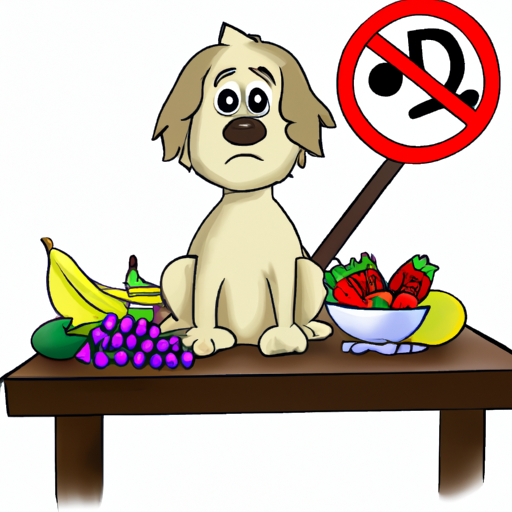As a caregiver for your furry friend, you may often find yourself wondering about the kinds of foods that are safe for them to consume. While many fruits are a healthy snack for humans, not all fruits are safe for our canine companions. In this article, we will discuss five different fruits that dogs should avoid at all costs.
1. Grapes and Raisins
Grapes and raisins may seem like a sweet treat, but they can be deadly for dogs. They can cause rapid kidney failure, which can lead to death if not treated promptly. Even small amounts can be harmful.
- Symptoms of poisoning: Vomiting, loss of appetite, lethargy, abdominal pain, and severe kidney failure.
- What to do: If you suspect your dog has eaten grapes or raisins, bring them to the vet immediately.
2. Avocados
Avocados contain a toxin called persin, which can cause vomiting and diarrhea in dogs. While the skin and pit contain the highest amount of persin, it’s best to avoid giving avocados to your dog altogether.
- Symptoms of poisoning: Diarrhea, vomiting, and abdominal discomfort.
- What to do: If your dog has consumed avocado, monitor them closely and consult your vet if symptoms persist.
3. Cherries
The pits, stems, and leaves of cherries contain cyanide, which is poisonous to dogs. While the fruit itself is not harmful, it’s best to avoid cherries as dogs may accidentally consume these parts.
- Symptoms of poisoning: Difficulty breathing, bright red gums, and dilated pupils.
- What to do: If your dog has eaten any part of a cherry other than the fruit itself, take them to the vet as soon as possible.
4. Citrus Fruits
Citrus fruits such as oranges, lemons, and grapefruits contain citric acid, which can cause upset stomach in dogs. While small amounts may not be harmful, it’s best to avoid these fruits to prevent any discomfort.
- Symptoms of poisoning: Diarrhea, vomiting, and depression.
- What to do: If your dog has eaten citrus fruits, provide plenty of fresh water and monitor their behavior closely.
5. Coconuts and Coconut Oil
While not exactly a fruit, coconuts and coconut oil can cause stomach upset and diarrhea in dogs. The high fat content can also lead to pancreatitis in some cases.
- Symptoms of poisoning: Diarrhea, vomiting, and signs of abdominal pain.
- What to do: If your dog has consumed coconut or coconut oil, ensure they have plenty of fresh water and consult your vet for further advice.
Frequently Asked Questions
1. Can dogs eat apples?
– Yes, but avoid the seeds and core as they contain cyanide.
2. Are bananas safe for dogs?
– Yes, in moderation. They’re high in sugar and should not be a regular part of your dog’s diet.
3. What should I do if my dog eats a dangerous fruit?
– Contact your vet immediately.
4. Are there any fruits that are beneficial for dogs?
– Yes, fruits like blueberries, cranberries, and watermelon can be a healthy treat for dogs.
5. Should I always consult my vet before introducing new foods to my dog’s diet?
– Yes, it’s best to consult your vet to avoid any potential risks.
Remember, as a caregiver, your dog’s health and safety are in your hands. Always consult a vet before introducing new foods into your dog’s diet.



